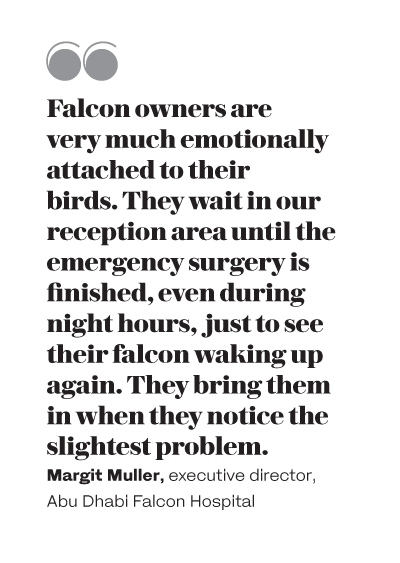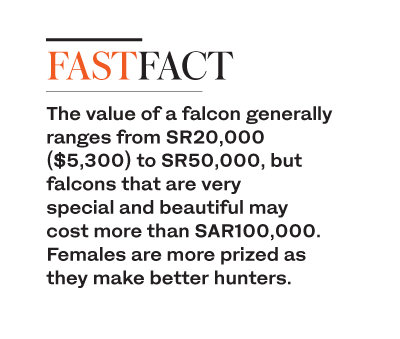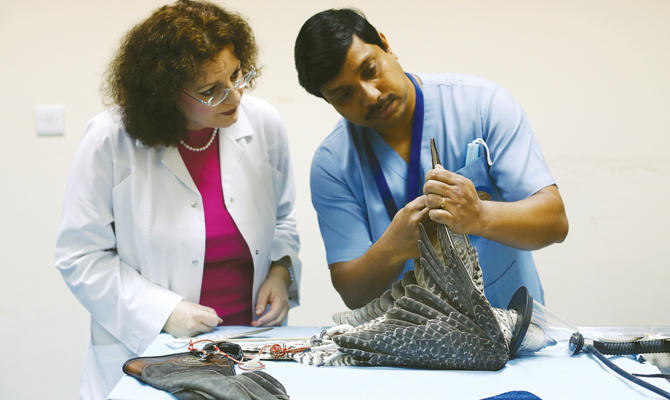DUBAI: As the national bird of Saudi Arabia, the falcon is both a symbolic marker of the country’s culture and tradition and a treasured pet to many of its residents — and it is the job of one Abu Dhabi avian expert to tender to hundreds of injured birds of prey flown in from the Kingdom each year.
On any given week, about 10 injured birds are transported from Saudi Arabia — many by private plane — to be treated by the expert hands of Dr. Margit Muller, executive director of Abu Dhabi Falcon Hospital, the world’s first hospital dedicated to the falcon.
An expert in the specialized field of avian medicine, Dr. Muller’s extensive knowledge means she is in constant demand to treat injured falcons from all over the world. She treats about 10,000 birds of prey annually, of which at least 500 — predominately the Saker falcon, the largest species of falcon — are from Saudi Arabia.
“Due to our international reputation as the largest falcon hospital in the world, our very advanced treatment methods and the latest technical equipment, every year we receive more and more falcons from Saudi Arabia for examination and treatment,” said the German-born avian expert.
“Most of the falcons that we received from Saudi Arabia are Saker falcons as they are the favorite hunting falcons in Saudi Arabia. Most travel by car or private plane. For a sick falcon, it is faster to come to us by plane than by car, which reduces delays until the treatment.”
Many Saudi Arabian owners are often distressed as they consider the falcon an integral “part of the family,” explained Dr. Muller.
“The vast majority of falcon owners consider and treat their birds like their own sons and daughters,” she said. “Their falcons occupy a special place in their homes — and even in their cars.”
“Therefore, the falcon owners are very much emotionally attached to their birds, as they really love them very much. Here at Abu Dhabi Falcon Hospital we often experience very distressed owners whose falcon has come in with an accident. They wait in our reception area until the emergency surgery is finished, even during night hours, just to see their falcon waking up again.
Only then they are relieved enough to go home again. ”Moreover, falconers bring their birds to Abu Dhabi Falcon Hospital even when they notice the slightest problem — like sneezing or vomiting — because they are extremely concerned and worried about their beloved falcons.”
They are also a valuable asset. Dr. Muller estimates that the average value of a falcon can range anywhere from SR20,000 ($5,300) to SR50,000.
“The price of a falcon depends on its breed and gender, as females are more prized because they are bigger and better for hunting, as well as being more beautiful,” she explained. “Moreover, in captive-bred falcons, the breeder’s reputation also plays a role in the price of the falcon.
“However, there are falcons that are considered to be very special and beautiful. They may cost more than SR100,000.”
Dr. Muller, who fell in love with falcons when she was training to be a vet and took a two-month internship in Dubai before obtaining a doctorate in veterinary medicine, said there is now about a 20 per cent increase year-on-year in the number of birds passing through Abu Dhabi Falcon Hospital.
Every day she will treat dozens of feathered patients with differing injuries or illness.
“In Abu Dhabi Falcon Hospital, we have treated many different kinds of injures,” she said. “Some of the cases that are being treated are falcons that have encountered major accidents, such as being hit by a car, have leg fractures, or are suffering from a bacterial and viral infection or a bleeding nose. They may be showing symptoms of being very weak, tired and emaciated, or are suffering from Aspergillosis (a fungal disease that affects the lung and leads to major breathing difficulties and loss of flight performance, and is potentially fatal).”
Dr. Muller said that her first step when interacting with a new patient is to examine the falcon to establish the correct diagnosis and treatment plan.
“Care and medical rehabilitation for falcons will depend on the bird’s medical condition, and ranges from normal hospitalization in our hospital wards, up to stays in our ICU for critically ill falcons,” she explained.
“They require 24-hour special care as well as specifically designed treatment protocols and special feeding programs.”
“In the case of bacterial upper respiratory tract infections, the falcon should be under medical care for one week. However, an injured falcon requiring surgical repair for a broken leg or wing should be under medical care for a month.”
Falcons who moult — the cyclic replacement of feathers by shedding old ones, while producing new ones in their place — usually stay for a minimum of six months.
“Here at Abu Dhabi Falcon Hospital, we have a very scientific moulting facility and it is really a big hit for falcons during moulting season,” she said. “Therefore, every year we receive more and more falcons from Saudi Arabia as their owners would like their falcons to stay in a professional and caring place during the moulting time.”
 Dr. Muller, who concentrated her thesis on foot disease in falcons and also has a diploma in veterinary homeopathy, became director of the ADFH in 2001.
Dr. Muller, who concentrated her thesis on foot disease in falcons and also has a diploma in veterinary homeopathy, became director of the ADFH in 2001.
“I always found falcons highly interesting and fascinating,” she said, with a smile. “When I came into contact with falcons during my veterinary medicine studies, I was so immediately attracted to them. The look in falcons’ eyes is like magic.”
After deciding to be a falcon specialist, Dr. Muller went on to share her experience with other veterinarians and falcon rehabilitation experts throughout the world by publishing her book “Practical Handbook of Falcon Husbandry and Medicine.”
Every day is a new challenge, she explains, but her work — which has earned international recognition — is something she says she is thankful for every day.
“There are always special cases of falcons, especially those which are very hard to treat, such as major accidents and fractures. The harder the case and the more the falcons suffer from an injury or disease, the more likely I get attached to them.
“It is beyond words to describe how much the falcons fight for their survival and how much they communicate their need of help through their eyes.
“The moment I look into their big black eyes, I am immediately attached to them and try my very best to help them as much as I can to save their life.
“It is what I feel I am here for.”














